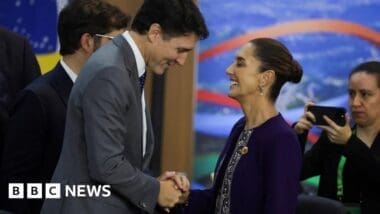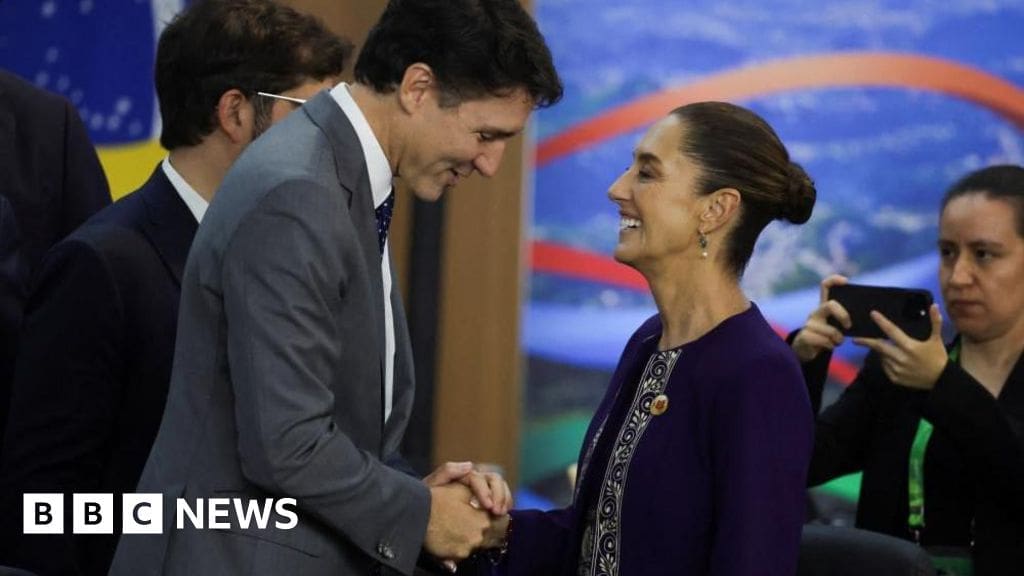Amid a brewing trade conflict, tensions between Canada and Mexico have intensified following President-elect Donald Trump’s declaration to impose a 25% tariff on both countries unless they secure their borders with the United States.
Canadian officials quickly attempted to differentiate their border issues from Mexico’s, suggesting that drug trafficking and illegal entries were significantly higher at the southern border. Additionally, Canada accused Mexico of serving as a backdoor for Chinese investments. Unsurprisingly, these statements have been met with disapproval from Mexico. President Claudia Sheinbaum retaliated, stating that ‘Mexico must be respected, especially by its trading partners,’ and pointed out Canada’s own societal challenges, such as fentanyl use.
The discord was further fueled by comments from Canada’s U.S. ambassador, Kirsten Hillman. During a dinner at Mar-a-Lago, Prime Minister Justin Trudeau reportedly told Trump that the northern border differs greatly from the Mexican border. Doug Ford, Premier of Ontario, echoed these sentiments, describing the comparison as ‘the most insulting thing’ he has heard from the United States, Canada’s long-standing ally.
Canada is actively positioning itself alongside the U.S. against China, promoting the narrative that China is flooding North America with inexpensive imports through Mexico. Reflecting these concerns, Canada imposed a 100% tariff on Chinese-made electric vehicles, following similar actions by the U.S. and EU. Canada also plans a 25% duty on Chinese steel and aluminum, measures not yet matched by Mexico.
The existing North American trade agreement, renegotiated during Trump’s first term, is set for another renegotiation in 2026. However, Ford and others are advocating for separate trade agreements between the U.S., Canada, and Mexico, influenced by escalating tensions with China. Danielle Smith, leader of Alberta, supports this approach, emphasizing the need for proactive solutions.
The economic stakes are high, especially for Ontario, whose economy is deeply intertwined with U.S. trade, reportedly amounting to over C$493 billion in 2023. Marta Leardi-Anderson from the Cross-Border Institute emphasized Ontario’s heavy reliance on U.S. trade, stating, ‘That’s a huge amount of economic energy from just one region of the country.’
Despite these economic concerns, Mexico’s lead trade negotiator, Gutierrez Romano, criticized Canada’s divisive approach, implying that it weakens North American strength against the U.S. Oliver Santín Peña, a professor at Mexico’s National Autonomous University, remarked that current bilateral ties between Canada and Mexico are far from ideal.
Sheinbaum, Mexico’s first female president, has promoted an image of respect and unity, advocating for Mexico’s stance as an equal partner while rejecting aggressive confrontations. She remarked on the necessity of defending Mexico’s rights, including those of Mexican citizens in the U.S.
As both Canada and Mexico navigate these diplomatic tensions, they continue to be key trade partners for the U.S., accounting for a significant share of North American goods and services trade. This underscores the intricate balance of economic and diplomatic relations within North America.
The unfolding tariff situation underlines the complexities in Canada-Mexico relations and highlights differing strategies in addressing border security and trade. As the two neighbors work through these challenges, the future of their partnership with the U.S. remains in question, demanding careful negotiation and mutual respect.
Source: Bbc














